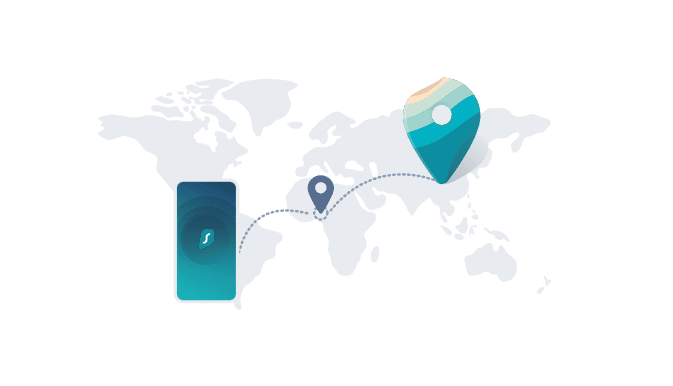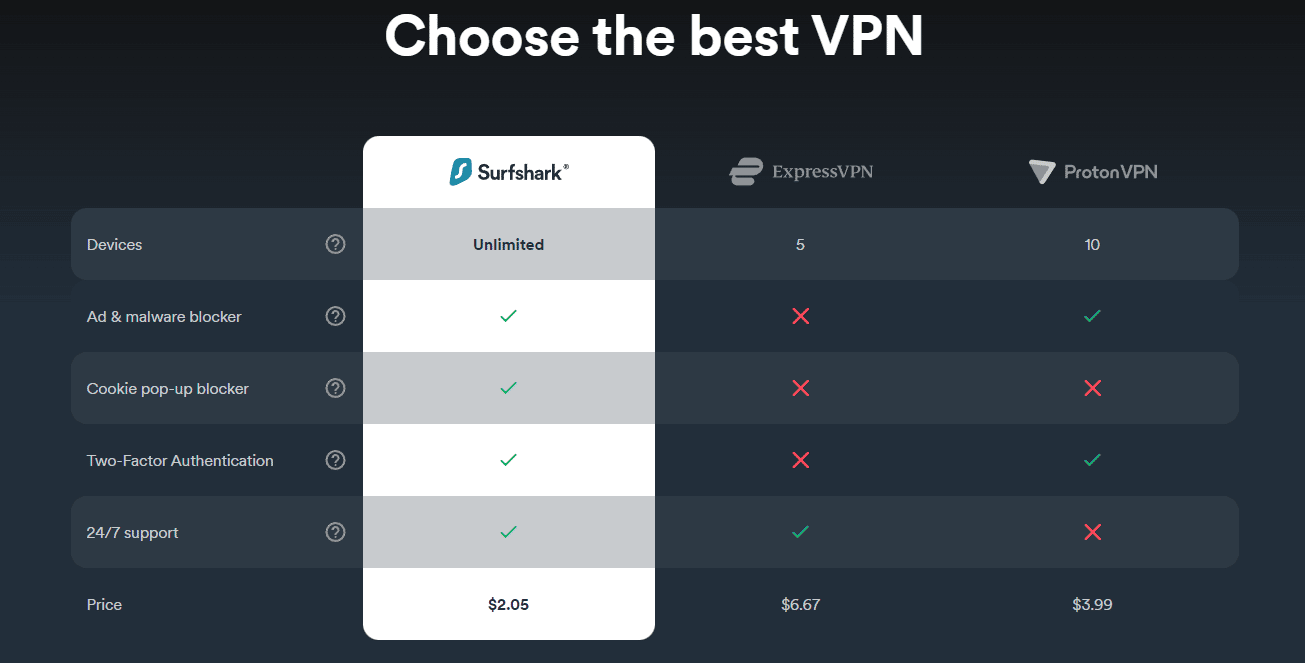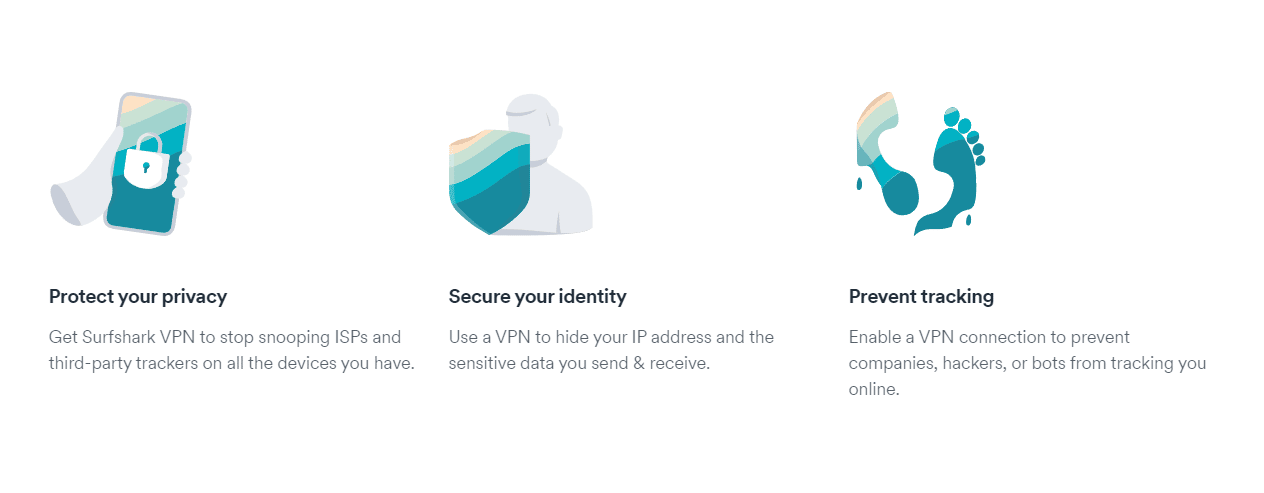The internet is a great tool for staying connected and getting work done, but it can also be a dangerous place. There are plenty of hackers and scammers out there looking to steal your information or infect your computer with malware. One of the best ways to protect yourself online is to use a VPN or “Virtual Private Network.”
The things you can do online are getting ever greater and with that comes more significant risks as well. Hackers and scammers know that with each new service that is presented online, a number of ways present themselves for them to steal your money or personal information to use for ever larger scam operations. This is where a VPN provider like Surfshark comes in for the rescue.
IMAGE: SURFSHARK
What Is A VPN?
A VPN, or Virtual Private Network, is a private network that encrypts and tunnels Internet traffic through public servers in order to secure user data. A VPN can be used to protect your online activity from prying eyes, as well as to access region-locked content.
There are two different types of VPNs that can be established: a point-to-point connection over dedicated lines or by tunneling the existing networks. Both types of VPNs offer some benefits that a WAN can provide; you just need to decide what you need before choosing a VPN.
If you work remotely, a remote access VPN is perfect for accessing your business network.
Geo-restrictions are another common reason for using a VPN. In some cases, certain websites or services are only accessible in certain countries due to copyright regulations or other restrictions. By connecting to the internet through a VPN server in another country, you can bypass these restrictions and access blocked content.
How Do VPNs Work?
A site-to-site configuration connects two networks and expands your network to different offices or groups them into a single data center. It might involve going through an intermediary network, such as connecting a business that has an IPv6 connection to an IPv4-only one.
An extranet site-to-site VPN joins sites belonging to multiple organizations and can be used for business-to-business, cloud computing, or branch office scenarios.
One of the most common protocols used by VPNs is IPsec, which is responsible for encrypting data packets and ensuring that they are not tampered with during transit.
Another popular protocol is SSL, which is often used in conjunction with IPsec in order to provide an additional layer of security. In order to ensure that data remains confidential, VPNs also use a variety of encryption algorithms, such as AES and DES.
In order to use a VPN, users must first install special software on their computers or devices. This software will typically prompt the user for their login credentials, as well as any other required information. Once the software has been installed and configured, users can then connect to the VPN by simply opening the program and entering the desired connection details.
10 Proven Reasons To Use A VPN When Using The Internet
For years now, more and more people are starting to use a VPN to protect them against malicious acts online. Here are 10 proven reasons why you should also deploy a VPN when using the Internet.
1. Connecting to a VPN server gives you a different IP address, which also means that any websites you visit will see this new IP instead of your real one. This is useful for two main reasons:
2. A VPN encrypts all of the data that is sent between your device and the VPN server. This means that even if someone were to intercept the data (like your ISP or government), they wouldn’t be able to read it.
3. Using a VPN can help to bypass censorship. In some countries, the government blocks certain websites or limits what you can do online. Connecting to a VPN server in another country can help you get around these restrictions.
4. VPNs can also be used to access geo-blocked content. For example, if you live in the US but want to watch a UK-only TV show, you can connect to a UK VPN server and access the content as if you were in the UK.
5. If you’re worried about someone tracking your online activity, using a VPN can help to prevent this. When you connect to a VPN server, your traffic is routed through an encrypted tunnel which makes it much harder for someone to track.
6. If you’re using public Wi-Fi, a VPN can help to keep your connection secure and prevent anyone from snooping on your data.
7. A VPN can also be used to improve your online privacy in general. Even if you’re not using public Wi-Fi or accessing censored content, using a VPN can help to keep your data safe from government surveillance and other third-party snooping.
8. VPNs can be used on all sorts of devices, not just computers. Many VPN providers offer apps for smartphones and tablets which can be used to encrypt your traffic and keep your data safe, no matter where you are.
9. Using a VPN doesn’t mean that you have to sacrifice speed or convenience. Many VPN providers offer fast servers and easy-to-use apps, so you can get online quickly and easily without sacrificing security.
10. Finally, using a VPN can often be cheaper than other alternatives. If you want to access geo-blocked content or improve your online privacy, there are many affordable VPN providers that can offer these benefits without breaking the bank.
How To Choose The Right VPN
There are a lot of different VPN providers out there, and it can be difficult to know which one to choose. Here are a few things to look for when choosing a VPN provider:
- Make sure the provider has servers in multiple countries. The more, the better. This will allow you to access content from around the world.
- Check the provider’s policies to see if they keep logs of user activity. You want a provider that doesn’t keep logs of your activity, as this could be used to identify you.
- Make sure the provider offers strong encryption. This will ensure that your data is safe from prying eyes.
- See if the provider offers a free trial or money-back guarantee. This will allow you to test out the service before committing to it.
IMAGE: SURFSHARK
Why Surfshark Is The One VPN To Rule Them All
If you’re looking for a VPN that can keep your browsing habits private and your data secure, like Surfshark VPN, then Surfshark is the cream of the crop and the one to rule them all. Here’s why:
- Surfshark uses military-grade encryption to keep your data safe from hackers and other online threats.
- Surfshark anonymizes your IP address, so your identity and location are hidden from prying eyes.
- Surfshark gives you access to blocked websites and content so you can browse the internet freely.
- Surfshark protects your devices from malware and other online threats, keeping you safe from harm.
- Surfshark offers a 30-day money-back guarantee, so you can try it risk-free.
- Surfshark VPN does not keep track of your online whereabouts or actions in any way.
With all these features and more, it’s no wonder that Surfshark is the one VPN to rule them all.
IMAGE: SURFSHARK
Conclusion
There are many reasons to use a VPN when accessing the internet, and we’ve only scratched the surface in this article. From protecting your privacy to unblocking geo-restricted content, a VPN is a powerful tool that everyone should consider using.
With Surfshark being the one VPN to rule them all, choosing Surfshark as your VPN provider will allow you to put your worries aside when using the internet for both work and leisure browsing.
IMAGE: UNSPLASH
If you are interested in even more technology-related articles and information from us here at Bit Rebels, then we have a lot to choose from.




COMMENTS